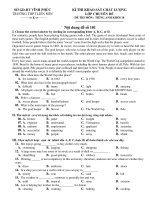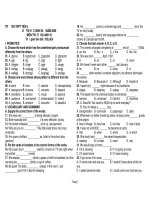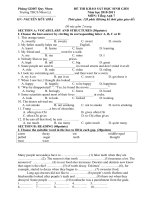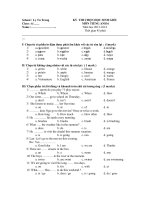- Trang chủ >>
- Đề thi >>
- Đề thi lớp 10
Đề thi HSG tiếng anh khối 10 lần 2
Bạn đang xem bản rút gọn của tài liệu. Xem và tải ngay bản đầy đủ của tài liệu tại đây (79.11 KB, 5 trang )
SỞ GD&ĐT VĨNH PHÚC
TRƯỜNG THPT ĐỒNG ĐẬU
KỲ THI CHỌN HSG CẤP TRƯỜNG LẦN 2
Năm học 2020 – 2021
MÔN: TIẾNG ANH 10
(Đề thi gồm 05 trang)
Họ và tên thí sinh:…………………….………..…….…….….….; Số báo danh……………………………..
PART A: LISTENING (10pts)
Listen and complete the form below. Write NO MORE THAN ONE WORD OR A NUMBER for each
answer.
Question 1-5
PAN ASIAN AIRWAYS
LOST PROPERTY REPORT FORM
First name
Kirsty
Surname
Allen
Address
(1) ___________________ Windham Road, Richmond
Postcode
(2)___________________
Home. Tel
020 8927 7651
Mobile. Tel
(3)___________________
Flight number
(4)___________________
Seat number
(5)___________________
From
New York
To
London Heathrow
Question 6-8: Choose THREE letters from A to F. What items did Kirsty’s bag contain?
A. 17 pounds
B. Pens
C. Her passport
D. A book
E. 200 dollars
F. Her house keys
Question 9-10: Choose a letter (A, B, C, or D) that correctly answer questions 9 and 10.
9. What has Kirsty done regarding to the loss of her credit card?
A. informed the police but not the credit card company.
B. informed the credit card company but not the police.
C. informed both the police and the credit card company.
D. informed neither the police nor the credit card company.
10. What must Kirsty do after the call regarding to her lost handbag?
A. Call back after one hour and a half.
B. Just wait for a call back
C. Call back after one hour and a half if she has heard nothing.
D. Call back the next day if she has heard nothing.
PART B: PHONETICS (10 pts)
Choose the word whose stress pattern is different from that of the other words
1. A. television
B. education
C. entertainment
D. information
2. A. conversation
B. isolation
C. traditional
D. situation
3. A. capital
B. activity
C. different
D. opera
4. A. affect
B. effective
C. expand
D. charity
5. A. family
B. probably
C. minority
D. animal
PART C. LEXICO-GRAMMAR ( 35 points)
I. Read the sentences carefully and choose the best answers to make complete ones.
1. The room was________ of strangers.
A. full
B. complete
C. crowded
D. filled
2. -“Do you mind if I take a seat?” -“___________.”
A. Yes, I don’tmind
B. No, do as you please
C. No, I mind
D. Yes, do as you please
3. Volunteers become well ____ of the problems facing the world.
A. aware
B. concerned
C. helpful
D. interested
4. I remember________ to Hanoi when I was a very small child.
A. taking
B. to take
C. to be taken
D. being taken
5. She made fun of me because I am from Africa. It was a_______________discrimination.
A. gender
B. race
C. education
D. Age
6. One of my relatives is _____________ to garlic
A. stimulating
B. stressful
C.sensitive
D. allergic
7. The ____ cheered loudly when the singers came out on the stage.
A. audience
B. spectator
C. public
D. watcher
8. Not only___________ to speak to him, but she also vowed never to see himagain.
A. she refused
B. Did she refuse
C. She did refuse
D. when she refused
9. The judge___________ the pedestrian for the accident.
A. accused
B.charged
C. caught
D. blamed
10. I’m happy ____ that you’ve passed your driving test. Congratulations!
A. not hearing
B. hear
C. hearing
D. to hear
11. We must________ our pounds for dollars before going to New York.
A.change
B.convert
C.turn
D. exchange
12. She________ shyly at him and then lowered her eyes.
A. saw
B. glimmed
C. glanced
D. glared
13. My watch was _________. Could you have the time ?
A. out of reach
B. out of order
C. out of work
D. out of the blue
14. Many people were injured when the building _________.
A. collapsed
B. destroyed
C. struck
D. erupted
15. Is modern English different ________ old English?
A. from
B. of
C. in
D. on
II. Write the correct FORM of each bracketed word.
1. She has one of the biggest ...................................in Britain. (COLLECT)
2. The judge told him it was .....................to drink and drive, and banned him for a year. (RESPONSIBLE)
3. The keys were locked inside the car . ................, a side window was open. (LUCKY)
4. Three companies are in ...............................for the same contract.(COMPETE)
5. It is forbidden to hunt for that kind of bird. It has been listed as one of the ...........species. (DANGER)
6. The government is spending a lot of money in the attempt to fight against ..................... (LITERATE)
7. These shoes look quite smart but they’re terribly.............................. (COMFORT)
8. Burning coal is an ......... way of heating a house. Gas is much cheaper. (ECONOMY)
9. They had a large…………………over the other party at the last election. (MAJOR)
10. Is inflation……………….of economic decline? (SYMPTOM)
III. The passage below contains 10 mistakes. Underline the mistakes and write their correct forms in
the space provided in the column on the right. (0) has been done as an example.
Traditional, mental tests have been divided into two types. 0. traditional → traditionally
Achievement tests are designed to measure acquiring skills and 1. _____________________
knowledge, particularly those that have been explicitness taught. The 2. _____________________
proficiency exams required by a few state for high school graduation
are achievement tests. Aptitude tests are designed and measure a
person’s ability to acquire new skills to knowledge. To example,
vocation aptitude tests can help you decide whether you would do
better as a mechanic or musician. However, all mentally tests are in
some sense achievement tests because they assumption some sorts of
past learning or experience with certainly objects, words, or situations.
The different between achievement and aptitude tests is the degree and
intention use.
3. _____________________
4. _____________________
5. _____________________
6. _____________________
7. _____________________
8. _____________________
9. _____________________
10. _____________________
PART D. READING COMPREHENSION ( 30 points)
I. Fill in the blank with a suitable word.
Dicky was born in Shoreditch, London in 1890. His family were poor and Dicky (1)________ had
enough to eat. Like many other boys in this area, he became a skillful thief. He took the things he
(2)________ to a Mr Welch, who bought them and then re-sold them. Dicky brought something to Mr Welch
nearly every day and (3)________ the money he received to his mother.
In Shoreditch there was a priest, Father Sturt, who did (4)________ best to help poor people. When
Dicky was thirteen, Father Sturt had a long talk with him and persuaded him to lead an honest life. He
(5)________ him a job with Mr Grinder, a local shopkeeper, and Dicky began to serve customers, deliver
goods and collect money. Dicky was much happier leading an honest life and dreamed of the day when he
would have his (6)________ shop. His mother was also pleased about his new job.
(7)________ person, however, was not happy, and that was Mr Welch. He was sorry to lose the
business Dick had brought him. He went to see Mr Grinder and told him (8)________ Dicky’s dishonest past
and said, quite untruthfully, that Dicky intended to cheat him. Mr Grinder believed these (9)________ and
told Dicky never to come near the shop again. In this way Dicky lost his chance of an honest life and
(10)________ to a life of crime. A year later he was arrested for theft and sent to prison.
II. Read the following passage then choose the best answer from the four options (marked A, B, C and D)
to complete the numbered blanks in the passage.
Several years ago while I was visiting Athens for a few weeks, I decided to spend a whole day on a
nearby island. The weather (1)________had predicted that it would be a scorching hot day so (2)________
off early in the morning.
Even though I arrived at the port in plenty of time, I was forced to sit on the top (3)________because
other passengers who had got to the boat earlier filled the lower ones. Soon after the boat had departed,
somebody came round with raffle tickets. There were, as far as I could make (4)________two prizes: a bag
of fresh fish and several (5)________ of chocolate. I bought a ticket, not expecting to win as I had never won
anything in a raffle (6)________.
Some time later the person who had sold the tickets announced the winning numbers. To my great
surprise, I had won the chocolate. I was naturally delighted, but (7)________how I could prevent it from
(8)________in the intense heat. Realizing that I could not possibly eat it all myself, I (9)________it with the
passengers sitting near me. In return, they offered me sandwiches and (10)________drinks.
All in all, it was a pleasant start to a memorable day with my new acquaintances.
1. A. prediction
B. prophecy
C. forecast
D. foresight
2. A. went
B. left
C. departed
D. set
3. A. deck
B. layer
C. floor
D. storey
4. A. up
B. out
C. for
D. over
5. A. bars
B. slices
C. cartons
D. packets
6. A. again
B. before
C. since
D. already
7. A. thought
B. questioned
C. wondered
D. regarded
8. A. dissolving
9. A. separated
10. A. soft
B. liquefying
B. divided
B. light
C. melting
C. distributed
C. bubbly
D. spreading
D. shared
D. sparkling
III. Read the passage and choose the best answer A, B, C, or D to each of the questions.
Large animals that inhabit the desert have evolved a number of adaptations for reducing the effects of
extreme heat. One adaptation is to be light in color, and to reflect rather than absorb the Sun's rays. Desert
mammals also depart from the normal mammalian practice of maintaining a constant body temperature.
Instead of trying to keep down the body temperature deep inside the body, which would involve the
expenditure of water and energy, desert mammals allow their temperatures to rise to what would normally
be fever height, and temperatures as high as 46 degrees Celsius have been measured in Grant's gazelles. The
overheated body then cools down during the cold desert night, and indeed the temperature may fall unusually
low by dawn, as low as 34 degrees Celsius in the camel. This is an advantage since the heat of the first few
hours of daylight is absorbed in warming up the body, and an excessive build - up of heat does not begin
until well into the day.
Another strategy of large desert animals is to tolerate the loss of body water to a point that would be
fatal for non-adapted animals. The camel can lose up to 30 percent of its body weight as water without harm
to itself, whereas human beings die after losing only 12 to 13 percent of their body weight. An equally
important adaptation is the ability to replenish this water loss at one drink. Desert animals can drink
prodigious volumes in a short time, and camels have been known to imbibe over 100 liters in a few minutes.
A very dehydrated person, on the other hand, cannot drink enough water to dehydrate at one session, because
the human stomach is not sufficiently big and because a too rapid dilution of the body fluids causes death
from water intoxication.
The tolerance of water loss is of obvious advantage in the desert, as animals do not have to remain
near a water hole but can obtain food from grazing sparse and far-flung pastures. Desert-adapted mammals
have the further ability to feed normally when extremely dehydrated, it is a common experience in people
that appetite is lost even under conditions of moderate thirst.
1. What is the main topic of the passage?
A. Weather variations in the desert
B. Adaptations of desert animals
C. Diseased of desert animals
D. Human use of desert animals.
2. According to the passage, why is light coloring an advantage to large desert animals?
A. It helps them hide from predators.
C. It helps them see their young at night
B. It does not absorb sunlight as much as dark colors. D. It keeps them cool atnight.
3. The word "maintaining" is closest in meaning to__________.
A. measuring
B. inheriting
C. preserving
D. delaying
4. The author uses of Grant's gazelle as an example of__________.
A. an animal with a low average temperature
B. an animal that is not as well adapted as the camel
C. a desert animal that can withstand high body temperatures
D. a desert animal with a constant body temperature
5. When is the internal temperature of a large desert mammal lower?
A. Just before sunrise
B. In the middle of the day
C. Just after sunset
D. Just after drinking
6. The word "tolerate" is closest inmeaningto__________.
A. endure
B. replace
C. compensate D. reduce
7. What causes water intoxication?
A. Drinking too much water very quickly
B. Drinking polluted water
C. Bacteria in water
D. Lack of water.
8. What does the author imply about desert-adapted mammals?
A. They do not need to eat much food.
B. They can eat large quantitiesquickly.
C. They easily lose their appetites.
D. They can travel long distances looking for food.
9. Why does the author mention humans in the secondparagraph?
A. To show how theyuse camels.
B. To contrast them to desert mammals.
C. To give instructions aboutdesertsurvival.
D. To show how they have adapted to desert life.
10. Which of the following is NOT mentioned as an adaptation of large desert animals?
A. Variation in body temperatures
B. Eating while dehydrated
C. Drinking water quickly
D. Being active at night
PART E. WRITING ( 20 points)
I . Complete the second sentence so that it has similar meaning to the first one.
1. This will be my student's first performance inCanada.
→ This will be the first time ………………………………………………………………
2. The number of people who understand his ideas exceed his expectations.
→ More people ………………………………………………………………………………
3. I only recognized him when he came into the light.
→ Not until.................................................................................................................
4. Our house is going to be painted by a local firm.
→ We are ...................................................................................................................
5. He could not afford to buy the car .
→ The car……………………………………………………………………..……
II. ESSAY WRITING
Some people say that cell phones have improved modern life. Others believe that cell phones have caused
many problems to people.
What is your opinion?
In about 200 - 220 words, write an essay to explain your point of view on this problem.
…………………………………………………………………………………………………………………
…………………………………………………………………………………………………………………
…………………………………………………………………………………………………………
…………………………………………………………………………………………………………
…………………………………………………………………………………………………………
…………………………………………………………………………………………………………
…………………………………………………………………………………………………………
…………………………………………………………………………………………………………
…………………………………………………………………………………………………………
…………………………………………………………………………………………………………
…………………………………………………………………………………………………………
…………………………………………………………………………………………………………
…………………………………………………………………………………………………………
…………………………………………………………………………………………………………
…………………………………………………………………………………………………………
…………………………………………………………………………………………………………
…………………………………………………………………………………………………………
…………………………………………………………………………………………………………
------THE END -----Thí sinh khơng được sử dụng tài liệu. Cán bộ coi thi khơng giải thích gì thêm.









